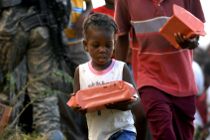Haiti struggles to control cholera outbreak as protests spread across the country ahead of election
Protests in Haiti that originated in the second largest city Cap-Haitien and nearby city Hinche, spread to the capital Port-au-Prince on Thursday (18 November) adding to their list of misfortunes since the earthquake in January 2010 in the capital, Port- au-Prince.

Protests in Haiti that originated in the second largest city Cap-Haitien and nearby city Hinche, spread to the capital Port-au-Prince on Thursday (November 18) adding to their list of misfortunes since the earthquake in January 2010 in the capital, Port- au-Prince.
Haitians are blaming Nepalese peacekeeping troops staying in the UN base for the outbreak, as the first incident of Cholera occurred in towns on the Artibonite River next to the UN base.
Haiti's president Rene Preval is trying to control matters, by asking people to stop the violence. "Violence will only bring more death to a country," he says, "and Haiti has already suffered enough."
At present they have a depressingly low mortality rate and extremely unsanitary conditions in the temporary slums, built after the earthquake. Preval is worried that things will only get worse if non-governmental organisations (NGOs) cannot access the people most in need.
Two protesters have died, one shot by a UN peacekeeper that fired in self defence. Protestors have constructed barricades around the city, and have been burning tyres and throwing stones and bottles at peacekeepers.
During protests last week a police station was set alight and stones were thrown at peace keeping bases. The UN World Food Programme base was looted and set ablaze, and UN flights carrying soap and medication have been cancelled.
Oxfam has suspended water chlorination projects and the World Health Organisation has halted their training of medical staff. It is thought that NGOs will be able to get to the North of Haiti at the beginning of this week.
On Thursday UN staffs were forbidden to go into the streets, due to the unruly and dangerous behaviour of the crowds. Helicopter observing from above had trouble seeing due to the smog created by burning barricades around the city of Port-au-Prince.
It is believed that riots are politically activated, and not just aimed at Nepalese troops, as protesters having been ripping election posters down across the country.
Elections start this week, but there is growing doubt that the voting will go ahead on schedule. It is believed that Haitians not knowledgeable about Cholera will be fearful and uncertain about waiting in busy queues and polling stations in order to vote. There are also doubts at the election's legitimacy, given the provisional electoral council's perceived bias towards President Rene Preval and his favoured candidates. Candidates loyal to Preval's predecessor, Jean-Bertrand Aristide, were barred from running.
The UN mission for Haiti, MINUSTAH said: "The way in which the events unfolded leads to the belief that the incidents had a political motivation, aimed at creating a climate of insecurity on the eve of the elections.
"MINUSTAH urges the population to remain vigilant and not to allow itself to be manipulated by the enemies of stability and democracy in the country."
The UN anticipates that within the next six to 12 months 200,000 will have contracted Cholera. Haiti's neighbour island, the Dominican Republic has already experienced a few cases of the disease, and Medecin sans Frontier hopes that the spread will not continue.
Author: Charity Knight | Climate Action
Image: The_U.S._Army_-_Soldiers_bring_food_to_children_in_Haiti | wikimedia/ creativecommons






